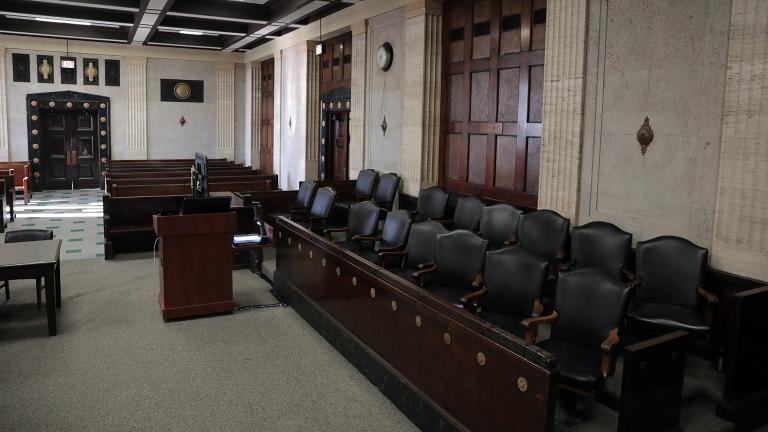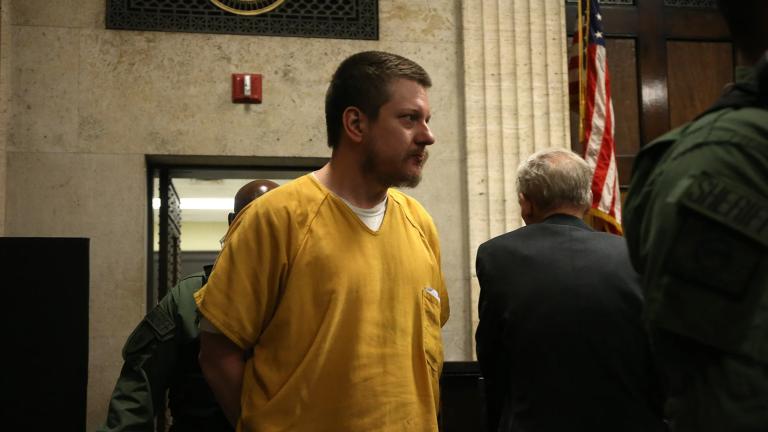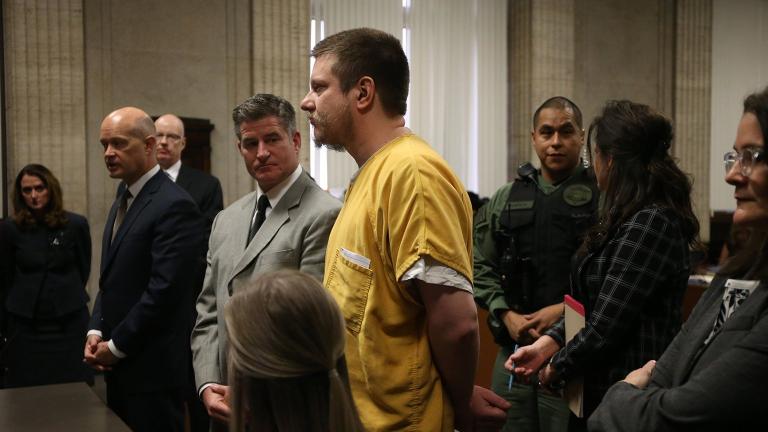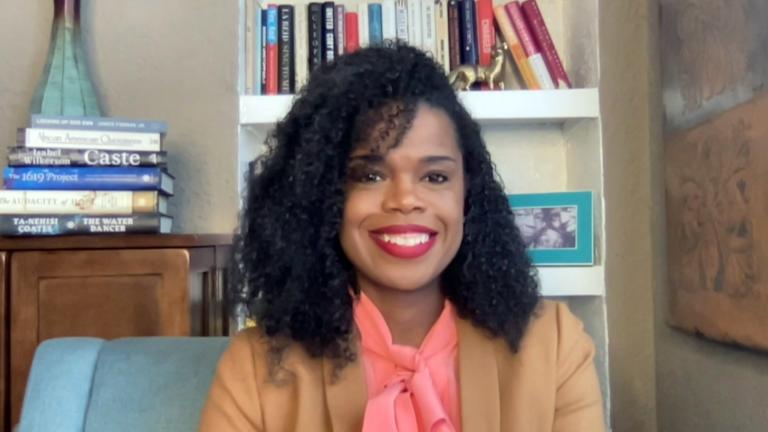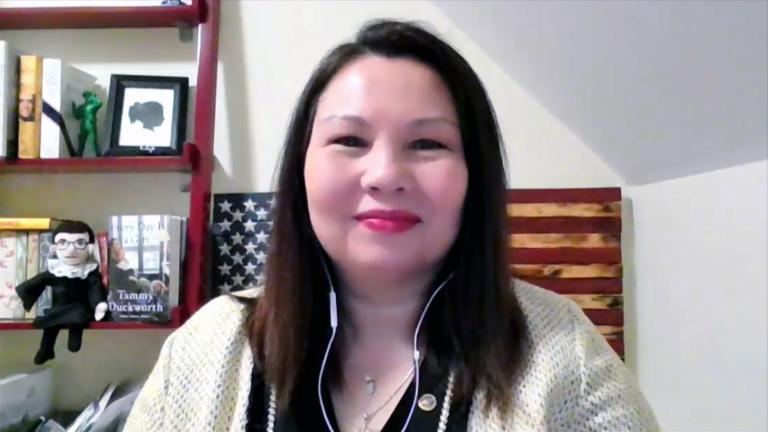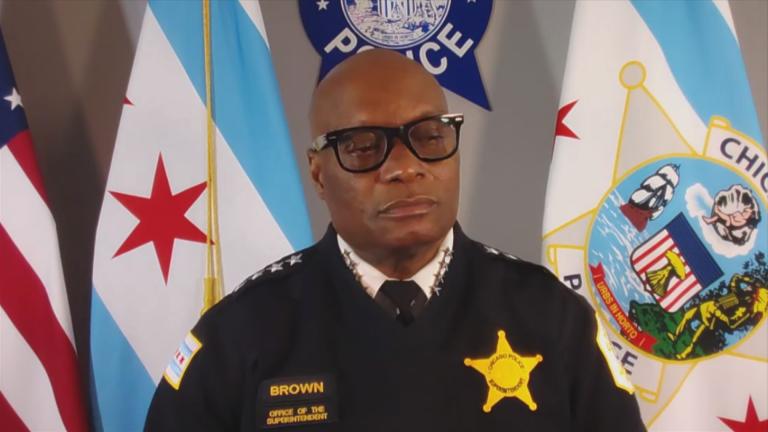From left: Special prosecutor Joe McMahon, attorney Daniel Herbert and his client, Chicago police Officer Jason Van Dyke, attend a hearing Friday, Aug. 17, 2018. (Antonio Perez / Chicago Tribune)
Moments after Chicago police Officer Jason Van Dyke was found guilty of second-degree murder, his attorney shared a common refrain he’d repeated throughout the months and years leading up to the high-profile trial: his client could never receive a fair trial before a Cook County jury.
“He knew the stakes here,” attorney Daniel Herbert said shortly after the Oct. 5 verdict was announced. “He knew the climate. We’re certainly going to review the issue of the change of venue, but we knew coming into it with a Cook County venue, in this case, with a Cook County jury there was not a chance in the world we were going to come away with a complete not guilty.”
Herbert had repeatedly pushed to move the case elsewhere in pretrial motions and hearings.
His team collected hundreds of “blatantly prejudicial” and “inflammatory” media articles, pointed to the “public execution” of their client in comments from public officials and presented an expert pollster who found 75 percent of Cook County residents familiar with the case believed Van Dyke was guilty of murder. All of it done to show that a fair trial in Cook County was impossible.
But following Van Dyke’s conviction, some legal experts believe that argument is destined to fail during Van Dyke’s impending appeal.
“Zero,” said veteran defense attorney Steven Greenberg, when asked the odds of prevailing on an appeal based around the venue change. “Zero chance of succeeding … I don’t know how they could even raise that argument.”
‘At least two years’
Van Dyke is due back in court next week for the first time since his conviction earlier this month on charges of second-degree murder and 16 counts of aggravated battery with a firearm in the 2014 shooting death of black teen Laquan McDonald. He was acquitted on one count of official misconduct.
Herbert will ask Cook County Judge Vincent Gaughan to dismiss some of those convictions, saying they’re not supported by evidence presented during the monthlong trial. After that will come sentencing, followed by an inevitable appeal that will continue on at least into next year.
“At this point, you’d be talking about quite possibly a year or better before you would know if a decision is just going to come down or if there’s going to be oral arguments and then a written decision,” said David Erickson, a former appellate court judge and current professor at IIT Chicago-Kent College of Law.
After sentencing, Van Dyke’s attorneys have 30 days to file a notice of appeal. That request is then sent to an Illinois appellate court, where it will be assigned a case number. From there, attorneys and the appellate clerk’s office work to prepare a common law record – or a collection of every piece of paper that’s been filed thus far in the case.
“That process sometimes takes six months,” Greenberg said. “And then at that point you have to file a brief, which is an oxymoron, because it’s a lengthy written document saying, ‘These are the mistakes that were made in the trial.’”
At that point, the state gets involved, filing a brief of its own in response to the defense’s claims.
The Cook County State’s Attorney’s Office typically handles this process for its own cases. But because the prosecutors in Van Dyke’s case came from Kane County, that brief may instead be filed by the State’s Attorney Appellate Prosecutor’s Office, which often handles collar county and downstate appeals.
The best case, Greenberg said, it that a response brief could be filed within six months. But it could take up to a year. The defense then has two weeks to issue its own response, though Greenberg said that deadline is rarely met.
And all this must be completed before attorneys even have a chance to argue their claims before a panel of three judges in open court.
“Then the appellate court could hear oral arguments – they don’t have to (but) they certainly will in this case – and then they rule,” Greenberg said. “And there’s no deadline on how long they can take to rule. I’ve had cases decided in a week and I’ve had cases take 12 months to get a decision.
“The long and short of it is that Van Dyke is going to be in custody probably for at least two years (before a ruling).”
But others see things progressing more quickly.
“I don’t think it’ll be that long,” said Jeffrey Urdangen, director of Center for Criminal Defense at Northwestern University’s Bluhm Legal Clinic. “You expect with private council and a well-funded reserve to tap into for legal fees, there’s going to be the expectation that this moves along quickly.”
Chicago police Officer Jason Van Dyke, left, reacts to his guilty verdict during his trial for the shooting death of Laquan McDonald, at the Leighton Criminal Court Building on Friday, Oct. 5, 2018. His lead attorney, Daniel Herbert, is at right. (Antonio Perez/pool/Chicago Tribune)
Appellate strategies
The reason an appeal based on trial venue is likely to fail goes back to jury selection.
Prosecutors and defense attorneys spent a week in September choosing the 12 jurors and five alternates who heard the case. During that process, both sides were granted seven peremptory challenges that could be used to strike a potential juror for almost any reason other than race.
Attorneys interviewed more than 50 Cook County residents before settling on the final jury. But in doing so, Herbert and his team only used five of their seven challenges, which could undermine their argument that an impartial jury couldn’t be found.
“Before you can complain that (you) couldn’t select a fair jury in Cook County, you have to use up all your challenges,” Greenberg said. “And they didn’t do that.”
Erickson could recall just a single case in which a similar argument was successful – that of Ohio doctor Sam Sheppard, whose story inspired the TV series and film “The Fugitive.” But he noted that case was “literally one in a billion.”
Even if that approach won’t work, Van Dyke’s attorneys will likely try to argue it – and anything else they can.
“As an appellate lawyer, you hit on everything and give the appellate court something to think about and discuss,” Erickson said.
Herbert has pointed to Illinois’ police use of force statutes, which he says gave Van Dyke the right to legally shoot McDonald in order to protect himself and other officers. The defense attorney believes jurors may have misinterprited those laws after some said they felt Van Dyke should have considered “lesser alternatives” to stop McDonald before shooting him.
Erickson believes any appeal would have to center on pretrial motions that shaped the evidence and witnesses presented during trial. Another issue could be jury instructions, which Urdangen said have proven to be a successful argument in past cases.
“That’s a fertile area to get a reversal if you’re a defendant,” Urdangen said, “if you didn’t get an instruction that you wanted.”
Sentencing could also play a role in Van Dyke’s appeal. But that hasn’t played out yet and legal experts have been split on the amount of time Van Dyke could spend behind bars.
Van Dyke faces up to 20 years on the murder conviction and anywhere from six to 30 years on each aggravated battery conviction. It remains to be seen, though, how Gaughan will fit those all together.
Greenberg believes there’s an argument to be made that Van Dyke should get probation or four years in prison, the minimum allowable sentences for second-degree murder. Erickson has heard from others who believe the officer should get 96 years – six years served consecutively on each of the 16 battery counts. Ultimately, though, he believes that’s an unlikely result.
“A jury has got in (its) head he doesn’t deserve to get a conviction that will give him a life sentence or 40 years or 60 years,” Erickson said. “It ain’t gonna happen. It’s not murder one.”
Contact Matt Masterson: @ByMattMasterson | [email protected] | (773) 509-5431
Related stories:
Jason Van Dyke Found Guilty of Second-Degree Murder
Closing Arguments in Jason Van Dyke Murder Trial Set for Thursday
Jason Van Dyke Takes Witness Stand, Tearfully Recounts Fatal Shooting
Van Dyke Defense Presents Fatal Shooting from Officer’s Perspective
Van Dyke Defense Opens with Testimony of Laquan McDonald’s Past
A Timeline of the Laquan McDonald Shooting

